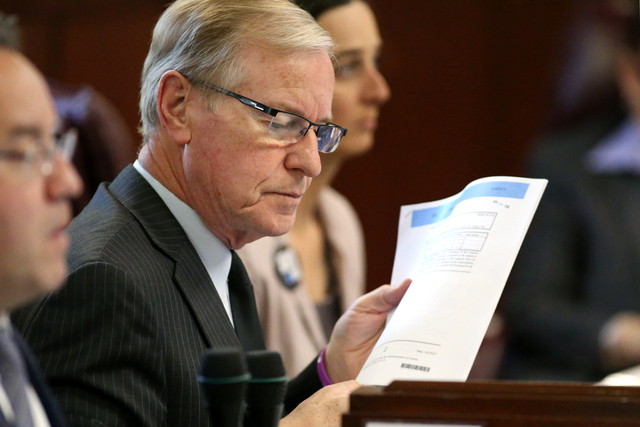No reason to oppose ban on anti-gay therapy
What’s the holdup with Senate Bill 353, anyway?
That bill, sponsored by state Sen. David Parks, D-Las Vegas, would ban what’s called “conversion” or “reparative” therapy for people younger than 18, basically a psychological assault intended to turn a gay person into a straight one. It’s been widely discredited by mental health professionals, but it still happens. The bill had a hearing back on April 6, but it hasn’t moved since.
Why?
It’s not the opposition: Only one witness opposed it, one who’s known for somewhat exotic testimony. In this instance, the word salad ranged from musings about where the Regional Transportation Commission puts bus stops to preferences for red apples over yellow.
Meanwhile, the bill was supported by a range of groups, from the Progressive Leadership Alliance of Nevada to the National Association of Social Workers Nevada chapter to the Nevada Advocates for Planned Parenthood Affiliates. Nationally, conversion therapy is opposed by the American Psychological Association, the American Psychiatric Association, the American Academy of Pediatrics, the American Psychoanalytic Association, the American Academy of Child and Adolescent Psychiatry, the American School Counselor Association and the National Association of Social Workers.
So, what’s the holdup?
It’s not the votes. The chairman of the Senate Commerce, Labor and Energy Committee, James Settelmeyer, R-Minden, said of conversion therapy, “It seems rather barbaric.” Fellow committee member Patricia Farley, R-Las Vegas, seemed amenable to banning the practice in her questions to Parks. And two of the committee’s Democrats, Sens. Kelvin Atkinson, D-Las Vegas, and Patricia Spearman, D-North Las Vegas, are both co-sponsors of the bill.
So assuming Sen. Mark Manendo, D-Las Vegas, is in favor, even if the two remaining Republicans on the committee voted no, the bill would still pass on a 5-2 vote and head to the Senate floor.
So, what’s the holdup?
It’s not the deadlines. The bill was granted a waiver by legislative leaders back on April 10, not coincidentally the deadline for bills to pass out of their first committees. With that waiver, the bill could be passed at any time through the end of the session.
So, what’s the holdup?
It’s not legal issues. California in 2012 passed a ban on conversion therapy, which was challenged in court. Plaintiffs contended the law violated the free speech rights of practitioners and of those seeking treatment. But the 9th U.S. Circuit Court of Appeals upheld the ban in August 2013, and the U.S. Supreme Court declined to hear the appeal in June 2014.
On Monday, the Supreme Court declined to hear a second case against conversion therapy arising over a New Jersey law that bans the practice, signed by Gov. Chris Christie in 2013. The lawsuit also raised free speech issues, but the 3rd U.S. Circuit Court of Appeals disagreed.
Those decisions mean bans on conversion therapy have been upheld in both states that have passed them.
So what’s the holdup?
Certainly, there are religious implications for the bill: Conversion therapy is rooted more in religious belief than it is on scientific research. (Yes, the American Psychiatric Association did list homosexuality as a mental disorder until 1973, but doctors once used leeches to treat disease, too. We learn things, we move on. That’s how it works.) And there are political implications, too: Social conservatives will not like the bill, and their votes may be needed on other issues as the 2015 session winds down toward its final deadline in June.
But Settelmeyer had it right: Conversion therapy is rather barbaric. He and his committee can fix that, however, by passing SB353. There’s really no legitimate policy reason left not to do so.
So, what’s the holdup?
Steve Sebelius is a Las Vegas Review-Journal political columnist who blogs at SlashPolitics.com. Follow him on Twitter (@SteveSebelius) or reach him at 702-387-5276 or ssebelius@reviewjournal.com






















